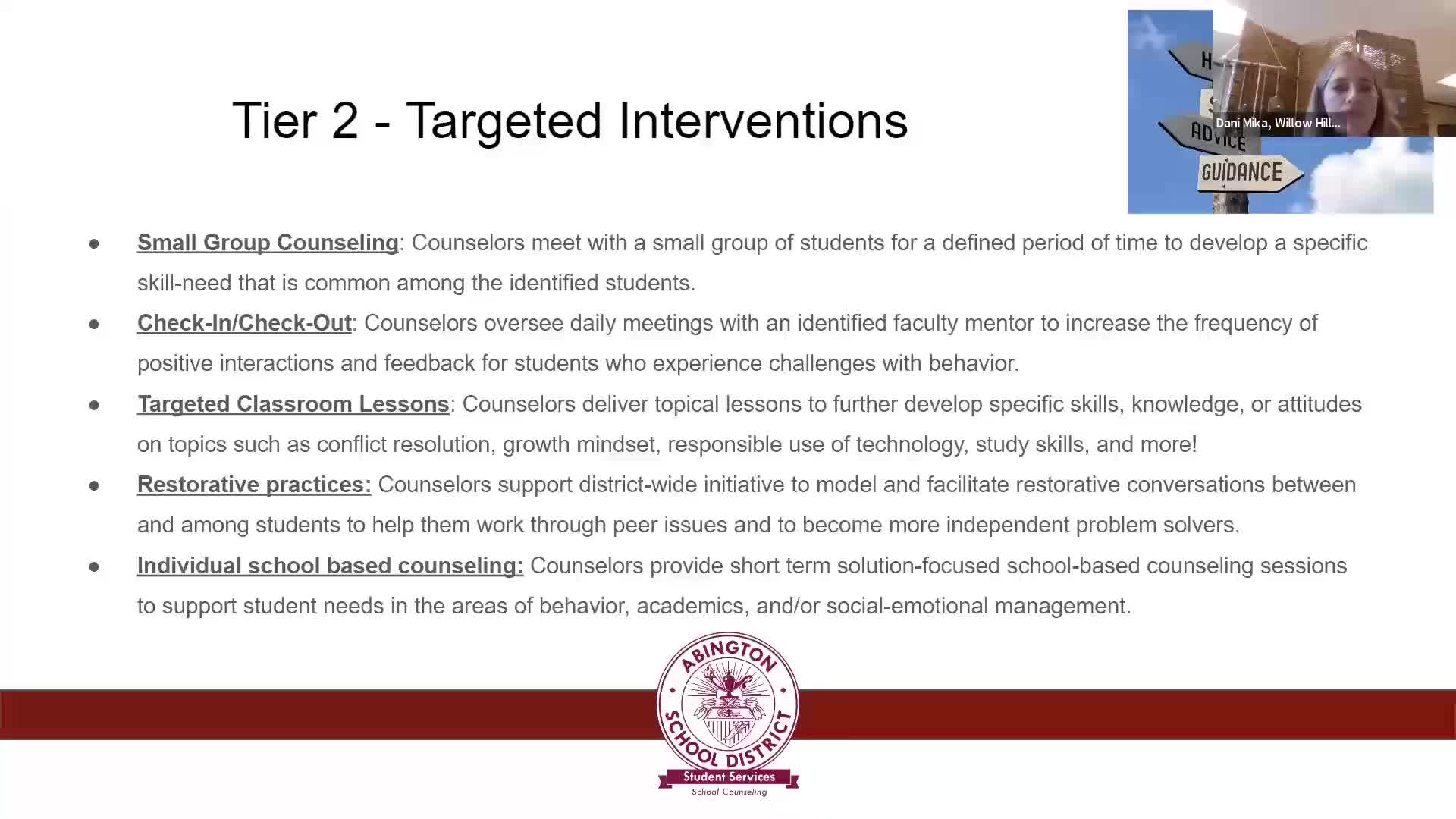School Counselors Implement Daily Support System and Tiered Interventions for Student Success
October 03, 2025 | Abington SD, School Districts, Pennsylvania
This article was created by AI summarizing key points discussed. AI makes mistakes, so for full details and context, please refer to the video of the full meeting. Please report any errors so we can fix them. Report an error »

The Abington School District held a meeting on October 3, 2025, to discuss the vital role of elementary counselors in supporting student well-being and academic success. The agenda focused on various counseling initiatives and programs designed to address the diverse needs of students.
The meeting began with an overview of the "check-in, check-out" system, a daily support mechanism where students meet with a trusted faculty mentor to start and end their school day positively. This process, overseen by counselors in collaboration with teachers, provides students with encouragement, clear expectations, and regular feedback to help them stay on track.
Counselors also deliver targeted classroom lessons aimed at developing specific skills such as conflict resolution, growth mindset, and responsible use of technology. These lessons are tailored to address the unique needs of different grade levels, ensuring that students receive relevant support. For instance, if a particular class is struggling with issues like gossiping, counselors work with teachers to create and implement a lesson focused on that topic.
The discussion then moved to restorative practices, which are integral to the district's approach to conflict resolution. Counselors facilitate respectful conversations between students, helping them navigate peer conflicts and build understanding. This method emphasizes listening and repairing relationships rather than assigning blame.
Individual school-based counseling was highlighted as a critical service, providing short-term, solution-focused sessions to support students in behavioral, academic, and social-emotional areas. For students requiring more intensive support, tier 3 interventions are available, which include personalized counseling and mentoring. Counselors also collaborate with parents to explore additional resources if a child's needs extend beyond what the school can provide.
The meeting further detailed the services offered through partnerships with community organizations. The Student Assistance Program (SAP) provides evidence-based mental health interventions within schools, facilitated by licensed clinicians. Additionally, the Child and Family Focus program offers outpatient therapy during school hours, making it easier for students to access necessary support.
Counselors encouraged parents to reach out if they notice significant behavioral or emotional changes in their children, ongoing social issues, or any family changes that might affect their child's school experience. The meeting concluded with a commitment to continue enhancing the support systems in place for students, ensuring they feel safe, confident, and capable in their school environment.
The meeting began with an overview of the "check-in, check-out" system, a daily support mechanism where students meet with a trusted faculty mentor to start and end their school day positively. This process, overseen by counselors in collaboration with teachers, provides students with encouragement, clear expectations, and regular feedback to help them stay on track.
Counselors also deliver targeted classroom lessons aimed at developing specific skills such as conflict resolution, growth mindset, and responsible use of technology. These lessons are tailored to address the unique needs of different grade levels, ensuring that students receive relevant support. For instance, if a particular class is struggling with issues like gossiping, counselors work with teachers to create and implement a lesson focused on that topic.
The discussion then moved to restorative practices, which are integral to the district's approach to conflict resolution. Counselors facilitate respectful conversations between students, helping them navigate peer conflicts and build understanding. This method emphasizes listening and repairing relationships rather than assigning blame.
Individual school-based counseling was highlighted as a critical service, providing short-term, solution-focused sessions to support students in behavioral, academic, and social-emotional areas. For students requiring more intensive support, tier 3 interventions are available, which include personalized counseling and mentoring. Counselors also collaborate with parents to explore additional resources if a child's needs extend beyond what the school can provide.
The meeting further detailed the services offered through partnerships with community organizations. The Student Assistance Program (SAP) provides evidence-based mental health interventions within schools, facilitated by licensed clinicians. Additionally, the Child and Family Focus program offers outpatient therapy during school hours, making it easier for students to access necessary support.
Counselors encouraged parents to reach out if they notice significant behavioral or emotional changes in their children, ongoing social issues, or any family changes that might affect their child's school experience. The meeting concluded with a commitment to continue enhancing the support systems in place for students, ensuring they feel safe, confident, and capable in their school environment.
View full meeting
This article is based on a recent meeting—watch the full video and explore the complete transcript for deeper insights into the discussion.
View full meeting